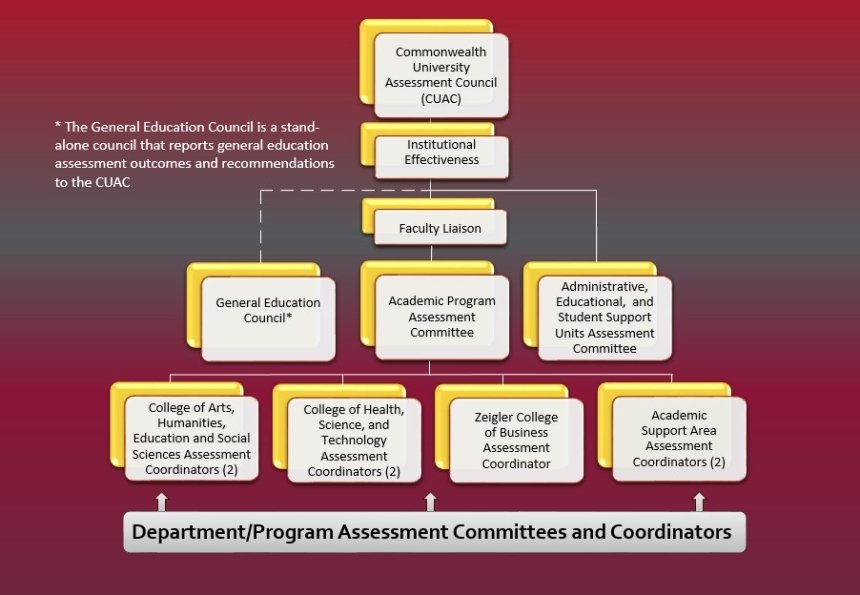Assessment
A culture of assessment is vital to making informed decisions, advancing strategic initiatives, improving educational outcomes, and strengthening the entire organization.
Holistic assessment requires both administrative and academic units to articulate performance goals and measures of success. For academic programs, well-defined student learning outcomes at the institutional, program, and course levels identify purpose, show alignment, and provide the foundation for an effective assessment plan that emphasizes data-driven decision making to increase student learning and success.
The Office of Institutional Effectiveness (OIE) supports planning and assessment to foster continuous improvement and institutional excellence and coordinates efforts with the Commonwealth University Assessment Council, General Education Council, Academic Program Assessment Committee, and the Administrative, Educational, and Student Support Units Assessment Committee. Assessment efforts are also supported significantly by the Faculty Liaison for Assessment, who leads the academic assessment efforts and mentors faculty in collaboration with OIE.
The overall assessment structure is provided in the figure below and described in more detail in the following tabs.

Assessment Council and Committees
The Commonwealth University Assessment Council (CUAC) oversees all aspects of assessment, facilitates academic and administrative reporting efforts across the institution, and ensures that recommendations derived from assessment are shared broadly and result in action toward continuous improvement. The charge and responsibilities further define CUAC’s role and purpose.
CUAC Charge: Responsible for providing governance, oversight, and advising to Commonwealth University on assessment processes to ensure disciplined self-assessment of institutional effectiveness (i.e., oversight of its sub-committees). The goal of the CUAC is to create a culture of data-based continuous improvement at Commonwealth. The Council’s work is done in collaboration with the Faculty Assessment Liaison and Office of Institutional Effectiveness (OIE).
CUAC specific responsibilities include to:
- Oversee the development, integration, implementation, and continuous improvement of institutional assessments, academic / academic support assessments, and administrative unit assessments to increase institutional effectiveness and student achievement
- Receive and review annual assessment committee reports and develop data-driven recommendations to realize Strategic Plan priorities, goals, and measures and elevate student achievement
- Evaluate and recommend assessment instruments and supporting technologies to facilitate assessment, archive data / documentation, and report findings
- Ensure assessment processes are aligned with budgeting and resource allocation
- Communicate effectively (e.g., email, meetings, web) high-level assessment results to key university constituencies and committees
- Develop and share recommendations with President’s Cabinet
| Commonwealth University Assessment Council | Names |
|---|---|
| College Assessment Coordinators for the following: | |
| Karen Guenther Brett Everhart |
| Mohsin Shaikh Jen Whisner |
| Wai Kwan (Elaine) Lau |
| Academic and Student Support Areas | Amy Downes George Rusczyk |
| AVP for OIE | Cori Myers |
| Faculty Liaison | Brett Everhart |
| At-Large Member | Ed Bowman |
| UCC Liaison | Ken Hall |
| Administrative Representative | Heather Feldhaus |
| Administrative Representative (Finance Rep) | Amy (Dicello) Laubscher |
| Provost or Designee | Gretchen Sechrist |
| GEC Liaison | Jamie Foor |
| Administrative Support (non-voting member) | Jessica Thomas |
| Technology Support (non-voting member) | Shane Jones |
Information / resources for CU members can be found at the Assessment and Accreditation SharePoint Site.
Additional, relevant web sites that support and / or share out institutional assessment data include Institutional Research, OIE-Sponsored Technology, and Surveys.
The General Education Council (GEC) serves as the curricular body responsible for making recommendations regarding the General Education Program, including General Education Program course inclusion and any revision to the General Education Program.
The GEC will serve as the body responsible for assessment of the General Education Program, with the Chair of GEC leading General Education Program Assessment.
GEC Purpose
The GEC oversees General Education at Commonwealth University, which includes coordination and assessment of the program.
The responsibilities of the Council also include:
- initiating, reviewing, and recommending policy changes regarding General Education;
- reviewing and recommending General Education curriculum; and,
- coordinating mentoring and assessment efforts with departments involved in supporting General Education program goals and student learning objectives.
GEC Composition
The GEC shall consist of 12 elected members, each of whom shall serve terms of three consecutive academic years. Each main campus (Bloomsburg, Lock Haven, and Mansfield) will elect four members at-large. Among the four members serving on the GEC at each campus, at least three colleges must be represented.
Eligible faculty must be tenured or tenure-track. The tenured and tenure-track faculty shall elect representation by campus. Faculty members will vote within their own campus.
The Provost of the Commonwealth University or an administrator designated by the Provost as well as the Associate Vice President for Institutional Effectiveness (or their designee) shall serve as non-voting members of the GEC.
Faculty Election Procedures
Election to the GEC shall be held every Spring semester. All GEC faculty position elections for academic year 2023-2024 and thereafter shall be for three-year terms.
The GEC shall consist of a Chairperson, who is also the lead for General Education Assessment. The GEC Chairperson will be elected at the final business meeting of the Spring semester. Newly elected members of the GEC shall have voting privileges in the Chairperson election; outgoing members shall not vote for the next chairperson.
GEC membership
Three-year term (Fall 2022 – Spring 2025):
- Mykola Polyuha (BL – Languages, Literatures, and Writing, COAHESS)
- Rebecca Willoughby (BL - Student Success, Non-Aligned)
- Heather Erb (LH – Languages, Literatures, and Writing, COAHESS)
- Jamie Foor (LH – Psychology, COAHESS) - Chair
- Cathy D’Ortona (MA – Mathematics, Computer Science, and Digital Forensics, COHST)
- Teri Doerksen (MA – Languages, Literatures, and Writing, COAHESS); Jeff Bosworth is Teri Doerksen’s replacement for Fall 2024-Spring 2025
Three-year term (Fall 2023 – Spring 2026)
- Loren Selznick (BL – Business, Innovation, and Technology, ZCOB)
- Atika Benaddi (MA – Business, Innovation, and Technology, ZCOB)
- Kim Batty (LH - Management, ZCOB)
Three-year term (Fall 2024 – Spring 2027)
- Luke Haile (BL-Health & Exercise Science, COHST)
- Kathleen Allison (LH – Health Science, COHST)
- Adrianne McEvoy (MA – History, Political Science, & Philosophy, COAHESS)
The Academic Program Assessment Committee oversees all aspects of academic assessment in coordination with the OIE and Faculty Liaison for Assessment. The charge and responsibilities further define the Academic / Academic Support Assessment Committee’s role and purpose.
Academic Program Assessment Committee Charge
Responsible for providing oversight and support of assessment processes to ensure disciplined self-assessment of institutional effectiveness in academic departments/programs and help the University share and utilize assessment data for decision making, resource allocation, and improvement. The Committee’s work is done in collaboration with the Faculty Assessment Liaison and Office of Institutional Effectiveness (OIE).
Academic Program Assessment Committee specific responsibilities include to:
- Support the development of measurable student learning objectives and their mapping at the institutional (i.e., General Education) and program levels
- Support the development, implementation, and evaluation of assessment processes for the periodic assessment of academic and academic support programs (e.g., review assessment cycles, information/data flow, and feedback loops; annual and five-year review reporting templates; and status of submissions and follow up)
- Mentor and support departments in developing and implementing quality assessment plans (i.e., methods of assessment, criterion/performance targets, assessment cycles, reporting and archiving results, actions, and closing the loop)
- Liaise with department chairs, program assessment coordinators, and faculty to identify concerns / issues regarding the assessment process
- Recommend professional development opportunities to increase institutional knowledge of assessment and supporting technologies
- Recognize best practices and excellence in academic / academic support assessment
- Submit annual summary report and recommendations to CUAC according to established timelines
Academic Program Assessment Committee Membership
| Academic Program Assessment Committee | Names |
|---|---|
| College Assessment Coordinators (5) | |
| Karen Guenther Brett Everhart |
| Mohsin Shaikh Jen Whisner |
| Wai Kwan (Elaine) Lau |
| Academic and Student Support Areas | Amy Downes George Rusczyk |
| AVP for OIE | Cori Myers |
| Faculty Liaison | Brett Everhart |
| Provost or Designee | Gretchen Sechrist |
| Associate Deans | |
| Angela Boswell |
| Todd Hoover |
| David DeVallance |
| Kimberly Olszewski |
| Ken Hall |
| Administrative Support (non-voting member) | Jessica Thomas |
| Technology Support (non-voting member) | Shane Jones |
Other Academic Program Assessment Roles
Faculty Assessment Liaison
Assessment efforts are supported significantly by the faculty assessment liaison, who leads the academic assessment efforts, mentors faculty, and provides ongoing communication with faculty in collaboration with OIE. The liaison receives a 25% alternative workload assignment.
College Assessment Coordinators
College assessment coordinators are appointed to serve as the link between department/program assessment coordinators and assessment committee(s). The coordinators communicate and elevate concerns and insights about program assessment to the Academic Program Assessment Committee. They attend committee meetings at least twice a year and attend the annual CU Assessment Council.
Program Assessment Coordinators
Program assessment coordinators serve at the department / program level. Faculty use their discretion to organize within the department in a manner that accommodates the needs of the department and the programs housed within it. Coordinators are responsible to collect program-level student learning data aligned with the identified academic program learning outcomes and report annually in accordance with the expected timelines, processes, and reporting technology tools.
Other Resources
Information / resources for CU members can be found at the Program Assessment webpage for detailed information about annual report and five-year Program Assessment Review (PAR). Other OIE web pages support institutional and program assessment efforts, including Institutional Research, OIE-Sponsored Technology, and Surveys. The Assessment and Accreditation SharePoint Site provides committee information.
The Administrative, Educational, and Student Support Units Assessment Committee oversees all aspects of administrative assessment in coordination with the OIE. The charge and responsibilities further define the Administrative, Educational, and Student Support Units Assessment Committee role and purpose.
Administrative, Educational, and Student Support Units Assessment Committee Charge: Responsible for providing oversight of assessment processes to ensure disciplined self-assessment of institutional effectiveness in administrative and student support programs and help the University share and utilize assessment data for decision making, resource allocation, and improvement. The Committee’s work is done in collaboration with the Office of Institutional Effectiveness (OIE).
Administrative, Educational, and Student Support Units Assessment Committee specific responsibilities include to:
- Support the development of measurable divisional/unit goals and their mapping at the institutional, divisional, and unit levels
- Support the development, implementation, and evaluation of assessment processes for the periodic assessment of administrative / student support units (e.g., review assessment cycles, information/data flow, and feedback loops; annual and five-year review reporting templates; and status of submissions and follow up)
- Mentor and support divisions/units in developing and implementing quality assessment plans (i.e., methods of assessment, criterion/performance targets, assessment cycle, reporting and archiving results, actions, and closing the loop)
- Liaise with divisional/unit points of contact to identify concerns / issues regarding the assessment process
- Recommend professional development opportunities to increase institutional knowledge of assessment and supporting technologies
- Recognize best practices and excellence in administrative unit assessment
- Submit annual summary report and recommendations to CUAC according to established timelines
Administrative, Educational, and Student Support Units Assessment Committee Membership
| Administrative, Educational, and Student Support Units Assessment Committee | Names |
|---|---|
| Academic Affairs Division Representative | Gretchen Sechrist |
| Administration Division and DEIB Representative | Kenny Hall |
| Enrollment Management and Student Affairs Division Representatives | Chris Lapos Amy Downes |
| Fiscal Affairs Division Representative | Amy Laubscher |
| University Advancement Division Representative | Nichole Lefelhoc |
| AVP for OIE | Cori Myers |
| Faculty Liaison | Brett Everhart |
| Vice president from non-academic division | Stephen Lee |
| Administrative Support (non-voting member) | Jessica Thomas |
| Technology Support (non-voting member) | Shane Jones |
Information / resources for CU members can be found at the Assessment and Accreditation SharePoint Site. One of those resources includes the Administrative, Educational, and Student Support Units Assessment Rubric, which will be used by OIE to provide some feedback to the vice presidents and the Administrative / Student Support Assessment Committee regarding assessment in this area with an intent to continuously improve work in this area.
Other OIE web pages support institutional and program assessment efforts, including Institutional Research, OIE-Sponsored Technology, and Surveys.
Annual Reports
The annual report PAR is submitted in the Commonwealth University instance of Nuventive Solutions Premier. The platform includes tabs for general information, curriculum maps, assessment plans / results, and an annual summary and action plan based on data collected and reported by the program and / or institutional research. This PAR - Nuventive User Guide provides instructions about how to access Nuventive and complete the screens needed for the annual report PAR, documenting program outcomes and action plans. Nuventive also includes a module for the assessment review rubric to provide feedback to programs on their submissions. Links to key resources, the user guide, Brightspace – faculty training, and program and institutional dashboards are included on the right side of the Nuventive’s platform split screen. Please see the Program Assessment web page for more information, direct access to training materials, and several expandable tabs for various program review data dashboards.
Please note: The annual report PARs with results / outcomes were originally due on May 31; however, ongoing evaluation of the assessment process and user feedback led to a change in due dates starting in 2024-25. An annual report PAR is due September 15 each year for each academic program (e.g., majors, minors, concentrations, certificates, etc.).
Each summer, CU’s divisions and over 60 units conduct operational planning, aligning their goals, initiatives, measures, and targets to the strategic plan. Plans are entered into Nuventive Solutions Premier by September 15 and outcomes are entered at year end. Initially, outcomes were reported by June 15, however, ongoing review of the assessment process and user feedback led to a change in due dates starting in 2024-25. Outcomes and resulting action plans are to be reported by July 15. Any outcomes not available by this date are to be reported as soon as available (e.g., at fall census date).
Divisional or unit points of contact can use the Administrative Unit – Nuventive User Guide and workshop recordings available on the OIE-Sponsored Technology web page.
Program Reviews
Before integration, the legacy institutions conducted annual and five-year program reviews, despite the BOG Policy 1986-04-A: Program Review being suspended in 2019. During integration, all CU programs, both administrative and academic, underwent a comprehensive review, which resulted in CU’s new academic and administrative structure, program array, and curriculum.
The State System BOG Policy 1986-04-A: Program Review and Procedure/Standard Number 2024-58: Review of Academic Programs and Programs in Support of the Student Experience were revised in 2024 and require, at a minimum, all academic programs and academic-/student-support programs to undergo a five-year program review.
In accordance with the BOG policy and PASSHE procedures, CU developed review schedules, templates, and processes for the review of units and academic programs, starting in 2024-25 with programs scheduled for accreditation reviews and 2026-27 for unaccredited programs and administrative, student support, and academic support units. This schedule allows time to implement plans and strategies developed during integration and adjust through annual planning and assessment.
In general, the process begins in the spring prior to the academic year of the review (per the schedule) with notification from the Office of Institutional Effectiveness and an orientation to the materials and process. The review takes place during the academic year with key milestones to facilitate completion and culminates with the August submission of each program’s executive summary to the Office of the Chancellor. The following tabs provide links to materials and guidance for the completion of program reviews.
- Program Review Schedule
- Program Review Process and Timeline
- Program Review Template
- Program Review Executive Summary Template (for submission to PASSHE)
- Program Assessment web page (with program review data dashboards)
Please see other Institutional Effectiveness webpages that provide information relevant to planning and assessment including:
Contact Information
- University-wide



